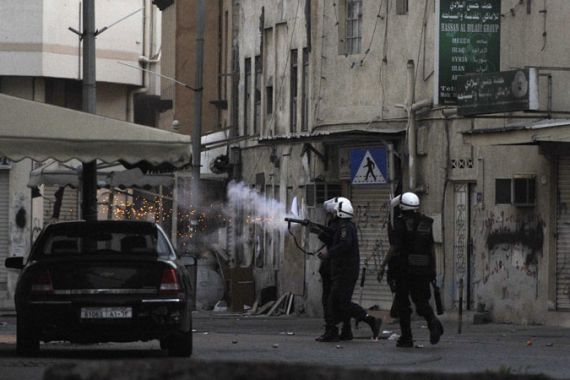Bahrain awaits rights report amid divisions
Government says it has implemented serious reforms since November, but opposition says major issues unresolved.

Manama, Bahrain – One way to understand the widening gap between Bahrain’s government and the opposition is through these two numbers: 90 per cent and 10 per cent.
On Tuesday the so-called National Commission will release its report to the king at his palace in southern Bahrain. It is a follow-up to a previous report, issued in November by the Bahrain Independent Commission of Inquiry (BICI), which documented widespread abuses committed last year during the country’s unrest.
Tuesday’s report will gauge how much progress the government has made in implementing the BICI’s recommendations, which include investigating claims of torture, ending arbitrary detention, and reviewing cases tried in military courts. The government says it has fulfilled most of the requirements, and a new website touts its progress.
“I would say about 90 per cent of the recommendations have been implemented,” said Abdelaziz bin Mubarak Al Khalifa, an official from Bahrain’s information affairs authority. “It’s been hard. We’ve had to swallow a lot of pride.”
Not so, says the opposition, which argues that the reforms have been mostly aspirational. The government claims to have stopped warrantless arrests, for example, but activists say that some people detained during night raids were not shown their warrants.
At a press conference in Manama on Monday, representatives from several opposition parties dismissed the National Commission as biased.
“It will say whatever the regime wants… the commission, which was appointed by the king, we believe it was illegitimate,” said Jawad Fairouz, a former member of parliament from Al Wefaq. “They’ve implemented less than 10 per cent [of the report].”
‘We need a new dialogue’
The diverging narratives over reform make it seem unlikely that the government and the opposition parties will resume negotiations anytime soon. Talks between the two sides have been stalled since last summer, when the king organised a “national dialogue.” Al Wefaq pulled out of that dialogue within weeks, and opposition leaders now dismiss it as “not serious.”
“The only way out of this crisis is dialogue, but not like the one last summer,” said Radhi al-Mousawi, a spokesman for Wa’ad, a secular leftist opposition party. “There needs to be a dialogue on all issues, not just political. We need to talk about political issues, jobs, security. We need a new dialogue between the authority and the people.”
Representatives from King Hamad bin Isa Al Khalifa approached members of Al Wefaq and other parties earlier this year to discuss another round of talks. The offer places the opposition in a difficult position, torn between a government that could paint them as obstructionist for refusing talks and activists on the street who are losing patience with any dialogue.
Their frustration stems partly from ongoing violence on the streets. Mourners clashed with police in Shahrakkan, a village in southern Bahrain, at the funeral of Sabri Mahfood, 27, who human rights groups say died from tear gas inhalation. It was the second such funeral in 24 hours: Similar clashes happened on Sunday after mourners buried Jaafar Jassim, 41, in Muqsha village.
At least 21 people have been killed since the BICI report was released in late November, many of them from tear gas inhalation, according to local human rights groups.
Pro-government groups, too, say the violence makes dialogue impossible: A report on Monday in the Gulf Daily News said that leaders of the National Unity Gathering and Al Fateh movement would reject talks “when violence on the streets has not stopped.”
‘They must be released’
Members of the so-called February 14 youth movement also say they will reject any dialogue until the government releases all of its political prisoners, a group which includes Ibrahim Sharif, the leader of Wa’ad, and Abdulhadi al-Khawaja, a human rights activist who has spent nearly six weeks on a hunger strike.
They were arrested last year and convicted in a trial which Amnesty International has said did not meet basic standards of due process. “The people who would speak for me in this dialogue, they’re all in prison,” said one activist.
Leaders of Al Wefaq and other parties say they’re willing to resume talks without any preconditions, but acknowledge that political prisoners must be released for those talks to have any legitimacy with activists.
“If we want this dialogue to have a positive reflection on the streets, then the [political] prisoners should be consulted, they should be released,” Fairouz said. “This is not a precondition. But by the end of the dialogue, they must be released.”
The issue of political prisoners is one of more than two dozen recommendations in the BICI report, which urged the government to review the convictions of anyone “charged with offences involving political expression.”
Even the government’s harshest critics acknowledge that it has fulfilled some of the BICI’s recommendations. The National Security Agency, for example – responsible for some of the most egregious detention practices – was stripped of its arrest powers by a royal decree in December. And civilian courts are reviewing some of the cases originally referred to so-called National Safety Courts, the military tribunals which handled hundreds of cases last year.
“No country in the world has moved so fast in implementing what has been done,” said Al Khalifa, the government spokesman. “We were not ready for the events of last year, and I think we’ve stepped up to our responsibility in the sense that, you know what, this has got to stop.”
But other issues remain unresolved. Several people have died under suspicious circumstances in police custody this year, for example, and human rights groups say torture is still a widespread practice in Bahraini jails.